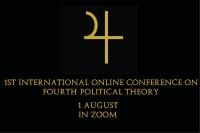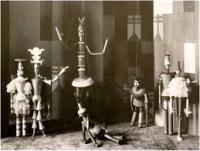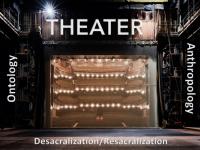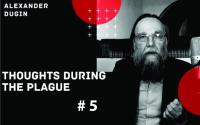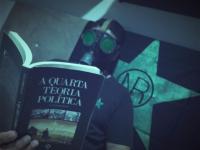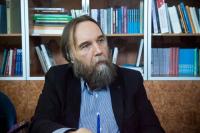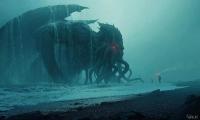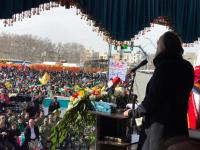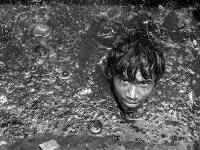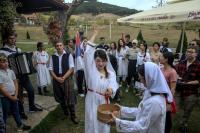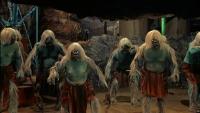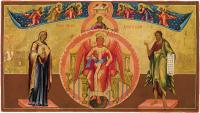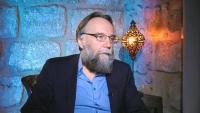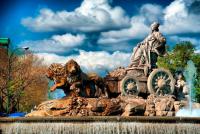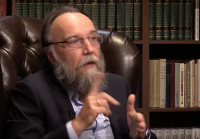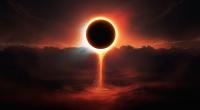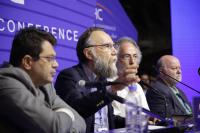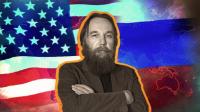4pt
Fourth Political Theory openly disowns liberalism
On August 1, 2020 the First Online International Conference on Fourth Political Theory (4PT) was organized by Professor Dugin (author of the Fourth Political theory), which was hosted by Paideuma TV. Around 200 participants from at least 40 countries have participated in the conference with different philosophical perspectives on the Liberal totalitarianism and liberal world disorder. This was the first international congress on the emerging Fourth Political Theory, which will play a crucial role in shaping the future of human civilization. The major theme of the conference was the brief discussion on the three political theories of modernity i: e liberalism, communism and Fascism, which are also the central focus of Professor Dugin’s book."
Congress on Fourth Political Theory (2020). Part 1. Introduction
1st International online conference on Fourth Political Theory
By the close of the 20th century, the violent battle between the three political theories of Modernity, i.e. Liberalism, Communism and Fascism, ended with the spectacular worldwide victory of the First Political Theory, Liberalism. This yielded the unipolar moment, Francis Fukuyama’s declaration of the “End of History” (as it at least seemed to be so in the 1990s), and globalization. “One World” began to be discernible based on one universal ideology – liberal globalism. In the 1990s, the overwhelming majority of analysts and experts, public figures and political scientists were inclined to believe that henceforth the economy and civil society would gradually replace politics and competition among nation-states. This created a new paradigm of truths and new obligatory epistemological criteria, such as those represented by such trends as cognitivism, techno-science, political correctness, and “LGBT+ culture.” This unipolar moment lasted until the year 2000, after which something went wrong (for the First Political Theory). The 9/11 attack, the gradual recovering of sovereignty of Putin’s Russia, the spectacular rise of China, the populist wave in Europe, and finally Trump’s election marked symptoms of the fact that Liberalism is in trouble, submerged in a crisis that has become more and more serious and irreversible.
Thoughts during the plague № 7: In the moment of quarantine we find out who we are
In Greek it was designated by three states: "moné" (the state of being in permanent calm), "próodos" (the state of exiting; precisely this term "pro", from, and "odos", to leave, meant at the same time "odos", journey and "pro", to: "exiting to", "from something to something" and thus exiting the state of "moné") and the third element, "epistrophé", "return". Thus there was a specific picture, at first a certain Origin that (always) remains in itself (the Being, apophatic, not yet outwardly manifested One, the human Soul, Spirit, Tradition, Philosophy, Thought, Logos) and to which corresponded various structures; it is that which in permanence is the most valuabe, sound, unchanging (for neoplatonics it didn't change depending on the other two motions). This means that in fact these vertical movements (exiting and return) didn't alter that Nature of Permanence, which equaled itself (dispassionately, always).
Ontology and anthropology of theater Lecture 1. Introduction to course
In the beginning we will talk about the ontology of the theater. Ontology is the study of being. So, in the ontology of the theater, we will consider how the theater relates to such a major philosophical category as being. That is, if Martin Heidegger’s main work is “Sein und Zeit”: Sein – being and Zeit – time, “Being and time”. This is the main philosophical work of the XX century and perhaps one of the most important in the whole history of philosophy. Our course is dedicated to “Sein und Theater”, that is “Being and Theater”. So, theater will be for us the same problematical category as "being" for Heidegger.
Thoughts during the plague № 5. Nergal and Erra call us to notice the essential
The plague gods teach us humility. God sends plague in monotheistic cultures so that a person remembers how insignificant and weak he is. And if we fight the plague by means of a state of emergency, a new number of masks, ventilators, only relying on doctors – then we, as Ereshkigal, say that we are not convinced – we will defeat the plague ourselves, we will not change our way of life, we will make fun and live as before, we will restore the capitalist economy, our secular values, our entertainments, our path of autonomous humanity, our research in the field of high technologies and AI, we will continue to modernize and digitalize our society, we will implant everyone during the epidemic and the quarantine with microchips, and thus overcome the plague ourselves.
Brief Draft of a Methodology for the Fourth Political Theory
Having said this, we consider that the reading of the aforementioned work reveals, in between the lines, a specific methodology, so to speak, a way of universal action to be adopted apt to allow the construction of positions informed by the Fourth Political Theory on the most diverse topics and in the most diverse areas of knowledge. In this sense, regarding the methodology, we are talking about something which belongs to the “praxis”, but in the measure in which this methodology depends on the comprehension of the Fourth Political Theory in order to be unveiled and, simultaneously, points towards the work of permanent construction of the same, this also belongs to the “theory”.
Alexander Dugin’s approaches to the history of Civilizations
Fourth Political theory with the fall communism in Russia, which marked a significant ideological crisis around the globe. For Dugin, all three ideologies either Liberalism, fascism or Communism was the product of European Modernity, which is under severe decline. Moreover, what Dugin emphasizes is the Post-modern critic on the degenerated European modernity that has given materialism an upper hand above the social and traditional domain.
Thoughts during the Plague № 2. End of globalization
The state of emergency, Ernstfall, it is very very serious and one who is in power in such a situation, is not likely to give it up voluntarily to anyone. This is, let's say, the positive side of the epidemic in which we now live. Of course, it’s important to deal with it, it’s important to survive, but you can’t reduce everything to solution of purely technical issues, it is essential to think about the future. And at the exit from this pandemic we will come across a completely new post-global reality.
DECONSTRUCTING AHRIMANIAN HENADOLOGY: THE NOOLOGICAL WAR AGAINST DASEIN
Negarestani's sinister angelology: OOO (Object Oriented Philosophy) is a metaphysical theory that expresses the supremacy of objects over the subject, it is the expression of Dasein's death in a world dominated by technique. Negarestani takes this metaphysical project and mixes it with an inverted form of Zoroastrianism, where rationality becomes an instantiator of new gods. The diabolical animism of this philosophy serves as a justification not only for the distancing from Dasein, but its elimination through the image of the Post-human. The “death of God” is for him the opportunity for the birth of new gods, who will destroy all categories of wholeness, thus structuring a sinister angelology. The destruction of the categories of totality (such as People, History, Subject) means the establishment of a completely flat reality, where there is no existential center, no foundation, no primacy of a foundation. This metaphysical desert is Ahriman's reign.
Speech on the 40 anniversary of Iranian Revolution (2020, Karaj/Alborz)
We should stand together with the awakened Iranians, awakened Shiites, awakened muslims and all awakened from other confessions and religions in order to participate on the same side in common struggle against Daddjal, the Lier which we call Antichrist and which is identified in the actual world in globalism, Western hegemony, global capitalism and murderous politics of United States of America with all theirs pawns, puppets and proxies.
The Iranian Revolution ids the revolt against modern World in favor of eternal truth and the coming age of the Restoration, Resurrection and establishing of global Justice. It is our common struggle – we have common enemy and we should feel ourselves as brothers in spirit and arms.
Introduction to Noomakhia (lecture 10) Noomahia in XXI Century
So, Russia is in trouble; its Logos, its people, its Dasein, its existential horizon. But 'nothing is lost when there is something that is not lost,’ as Curzio Malaparte has said. So I think that we are in a situation that is structurally close to the situation of Serbian people. We have different scale, different power, different space, different number of population, but the problem is the same. And Russia could not be regarded as the answer or alternative to what is going on. It is only the other place where the Noomahia still continues, with domination of the Cybelian Logos. So we are inside of Cybele. We are not outside of Cybele. That maybe was remarked by Milos Crnjanski in his final result of his book, that Russia is good but that is not the answer for Serbian quest for identity. Milos Crnjanski’s result or summary is a tragic one because Serbs become kind of in exile, in permanent exile, with no motherland left for them. But all the hopes on Russia should be measured with this pessimistic but very open solution of Milos Crnjanski because he loved Russia, and Serbians love Russia. And that is good, but when we have too much incorrect expectations, we could miss the question and unity in fight with something that already accomplished and perfect. So that is very important to Serbs and to all the fighters of identity to know that Russia fights. Russia is not yet defeated formally, because our people is, because it exists. But we have so great problem with Russian Logos, we could not yet start to continue the situation when our effort to create Russian philosophy was cut drastically by Communists. So we are outside of the place where really philosophy begins. We are outside. And this place is not attained, not reached yet. We are fighting to go to this moment. And because of great damage we had during last hundred years, we could not restart the process. In Russia today, there is pure social madness. We could not speak with nobody. As people, we are very good and open and very Christian, but as a kind of bearer of some intellectual ero. With so big people, so few people capable concretely to think, it is unimaginable. That is a kind of deep, dogmatical sleep (not dogmatical in the positive sense, it’s adogmatical), modern, post-modern sleep, conservative sleep of the people. So we are sleeping but that is good thing that we could be awake, lets hope.
Introduction to Noomakhia (lecture 9) – Serbian Logos
Let us concentrate on the Serbian Logos. First of all, it is sure and certain there is such thing as Serbian Dasein or Serbian existential horizon. That is absolutely sure because there is the Serbian people. And having Serbian people, that means that there is such thing as Serbian Dasein and Serbian existential horizon. As long as I know, there is no one who has dedicated to describe fully Serbian Dasein with Heideggerian categories, but it is up to some level, the technical task. If we understand what we have said about noology, about Dasein, about existential horizon, and knowing being and time of Heidegger, we could apply his categories (he called that existentials) special categories to describe Dasein. And it is technical task to apply that to Serbian Dasein.
Introduction to Noomakhia (lecture 8) Modernity
So we consider the modernity not as the fate 'cause we have it now and we will have it tomorrow, and we are obliged to be modern’ and so on. Traditionalists affirm that to be modern is a decision. You can be modern or you can be not modern. And they have created two concepts - the tradition and the modernity. So modernity is not something actual. That is a kind of society or civilization or world vision or picture of the reality. That is one thing. And there is tradition. That is the picture of reality, the civilization, the culture, and the society that is different. And between them, affirmed the traditionalists, there is antagonism. That is very important because that gives us the possibility to study modernity not as something inevitable but as something that is the product of concrete historical development based on concrete sequence of decisions and choices.
Introduction to Noomakhia (lecture 7) Christian Logos
The early Protestants, and above all, the German mystics (Meister Eckhart, Heinrich Seuse, and at a lesser scale Albertus Magnus) affirmed that there should be inner relation between the heart of the man with the Christ. It should not pass through exterior relations. For us there is no problem because in Orthodox tradition we recognize both. We recognize completely the authority of the Church and completely this direct relationship because we have the other concept of the Church. For us, the problem could not exist because we could not understand that. In our situation, there is no split. There are both. We have both ways - inner and outer. But for Western Christian tradition, there was a problem. And the first pre-Protestant mystics said ‘good, let us accept the outer exterior form but let us proceed in an inner way.’ And they were Platonic because they said that we have the direct relations with God and God could speak inside of us and that is our inner dimension. So they were purely Christian. In our situation they were closer to Orthodox in some ways. There were excesses, as well, of Platonism. For example, Meister Eckhart said that there is something beyond the Trinity, unity beyond the Trinity. That is not too much Orthodox. But nevertheless the main idea was so. This radical subject concept, the concept of the inner self that is living in the heart, and the ‘inner Christ’ as they called it was at the origin of Protestantism (in Wycliffe, Hussites, Czechs, German mystics). So that was legitimate up to some point.
Introduction to Noomakhia (lecture 6) Christian Logos
We were very close to it in the Dusan the Strong in your history, with the first and the second Bulgarian Kingdoms in the history of Bulgarians, we were close some time in the Polish Kingdom with Lithuanian and Great Moravia as well with some philosophical tendency. But we have never achieved the final version of this Logos in Eastern Europe, as well in Russia. We didn’t achieve the final version of Logos. Our existential horizon is not finished. It hasn’t received the last form. And that maybe is our historical challenge. And Slavophile thinkers saw that we came to the history later than the other when there was already a huge building of German philosophy, German political history, French philosophy, Roman philosophy, Greek philosophy, and as well political history. We Slavs have arrived to this a little later, not in the history, but to the understanding of history, to Logos of history, and to our philosophy. Our philosophy is a little bit childish and infantile. There is great example, great explosion of intellectual richness of precious thinkers such as Petar II Petrović-Njegoš metaphysical as well, Russian Dostoyevsky but all that is a kind of feeling of coming of our Logos and not the Logos itself. We are living in the anticipation of the Slav Logos. And when we study the past, we see many heroic deeds but we could not say that is our Logos. No. That is something like that. There is Saint Sava in Serbia. That’s anticipation of the Serbian mission, of the history. The creation of Nemanja Dynasty, Russian Ivan the Terrible and the other moments in our Slavic history are anticipation of Logos and not the Logos itself. That’s my personal opinion and it’s more difficult to describe our own Logos than to study the Logos of the other because it demands very deep introspection inside in our culture.
Introduciton to Noomakhia (lecture 5) Logos of Dionysos
I have already mentioned Edmund Husserl and his concept of intentionality. According to Husserl, intentional act is the act directed towards something that exists outside of our mind but that has no quality in it. So any quality that we are dealing with is inside of mind. Husserl calls that noema. The process of intentional act is noesis and noema is something that is thought of. So we are dealing with the qualities of the objects that are inherent to our process of thought and not exterior to it. So that is phenomenology. Heidegger is a continuation to this phenomenological tradition as are many others. But Gilbert Durand proposes a different way to this phenomenological approach and he speaks about the regimes of imagination. That is very important. Gilbert Durand affirms that our imagination works in three regimes. And that is very very close to the concept of three logos. Now we are going to see how. Regime of imagination is a kind of inner state of the structure of human mind that creates different sequences of basic principle images, symbols and structure. According to Gilbert Durand, there are three regimes. First is diurne, which is the regime of day. That is the regime of light that is based on the concept of strict duality. So there are strict and absolute differences. So when we divide and separate (regime of diurne is to separate, not unite, only separate) everything is clear as in the daylight. And this regime as well is a regime of vertical organization of the space. It is linked, according to Durand, with the postural reflexes of the child. When the child begins to stay in vertical position, it is considered by imagination as a flight. He is a kind of arrow that is going to the heaven. That is the flight.
Introduction to Noomakhia (lecture 4). Logos of Cybele
n our European civilization, we have two existential horizons and two daseins. One is the Logos of Apollo represented by the official ideology, three functional ideology, and the other is the Logos of Cybele. That is very important in the shadow part, in our subconscious, in the mother tradition. It is a part of the second parallel, hidden, or secret ideology. It is not the void. It is an ideology that is present in our societies but is not obvious, is not explicit. It is an implicit Logos of Cybele but is still alive because we are living in the civilization with the huge part of agriculture system and economy because we continue to produce and to consume the agriculture and food and we are sedentary. This level which we could individuate put the concept of the Logos of Cybele, not to the ancient types, but the Logos of Cybele exists now inside of ourselves, because our society is partly based precisely on this moment of noomahia. But noomahia is a continuing process. We could not once and forever grant the victory of one logos. If the Logos of Apollo weakens, that means that some other pole will become stronger. If the patriarchy dissolves (which is the case now in modernity), the other counter-current begins to appear, becomes more and more explicit, not implicit. That is the most important result of this noological analysis.
Introduction to Noomakhia (lecture 1) What is Noomakhia?
Dear friends: it is the final part of our geopolitical Serbian School experimental course. That is based on the previous lecture courses that are already made. I presume that you have understood well the previous courses. They are necessary to understand this final metaphysical and philosophical summary of multipolar approach to understand the very essence of modern situation concerning cultures, civilizations, societies, globalizations, and the place of identity in this context. Noology is the new philosophical discipline or approach developed by Romanian and Russian school of thought. There are two branches in noology; one Romanian and one Russian. Romanian is represented by philosopher Lucian Blaga and his kind of continuator, modern Professor Badescu. Russian noology is completely different but having the same sources of inspiration as developed in my person and my friends. I have published already 18 volumes of Noomahia, more or less 800 pages each one. So that is a kind of already made work. It is not finished yet. I’m working on the 20th book now. But it will have 21, maybe 22 volumes in all. So that is the project that is based on the special philosophical, metaphysical approach I try to explain in this course, in the ten lectures. They are very important because they are a kind of summary of everything said and done before. Excuse me for speaking English but the problem is not only that we lack the qualified translator from Russian to Serbian but there are kind of new created terms as well in Russian. For Russian to understand noomahia in Russian is difficult. For Serbia, it’s almost impossible because nobody can make a correct translation. If I would know Serbian well enough, I would prefer to make this lecture in Serbian but I doubt that there is someone besides myself that could make such philosophical translation. So excuse me for English in this course but I could stop or return to the point if you miss something.
The New Program of Philosophy
Today the West is imposing not its system, but its systemlessness, not its obviousness, but its doubt, not its assertion, but its deep internal crisis. When we join the global network, we do not receive a new identity and we do not come into contact with a new world. We simply irrevocably surrender to the storage room with a forgotten entry code those remnants of what made us who we were before and that reality in which we lived before. The act of dropping old certitudes and definitions is quite specific: it is a passport to the “new times”, a credit card for complicity in globalism, a mandatory requirement, and all those who reject this “initiation into globalism” automatically end up on blacklists, henceforth deemed agents of the “axis of evil” – after all, they did not catch the “latest news” that the world and the human are dead (following the death of God).
Principles for Comprehending Chinese Civilization
China is recognized to be an independent and unique civilization by virtually everyone, and therefore there is no need to prove this. Rather, we are faced with attempting to reveal the structure of this civilization’s Logos and to determine as much as is possible its geosophical map both within the borders of China and beyond, as well as in its dialogue with neighboring civilizations.
Chinese culture has exercised an enormous and at times decisive influence on neighboring peoples, first and foremost on Korea, Vietnam, and Japan, all of which during certain eras held themselves to be part of Great China – not in the sense of political unity, but as indelible and organic parts of Chinese civilization and the Chinese horizon. This horizon also substantially impacted the peoples of Tibet as well as the nomads of Turan bordering China from the North. Moreover, we can encounter definite influences of the Chinese element among the peoples of Indochina and South-East Asia, such as in Cambodia, Laos, Myanmar, Thailand, Malaysia, as well as, although to a lesser extent, Indonesia and the Philippines.
The Radical Subject: Alexander Dugin on the Origins of His Philosophy
The New Metaphysics, which describes the ontological situation of extreme despair and the completely God-forsaken world, took shape in my consciousness in the early 1980s under the impression of my grasp of Traditionalist thought (Guénon, Evola, Schuon, etc.) and under the conditions of late Sovietism. Being attracted to the Hermetic tradition, I went to a chemical shop and asked for sulfur, mercury, and salt, to which the clerk replied with scant courtesy that they did not have any of the above, and that everything could only be distributed on approved ration coupons anyway. I didn’t have any coupons, nor any permission. Thus, for the first time, I laid out the approaches to the “New Metaphysics” in an unpublished article written in 1985, Sverkhchelovek (“Übermensch”). The essential point of this article boiled down to reflecting on the Nietzschean definition of the Übermensch, as described in detail by Evola in his Ride the Tiger. “The Victor over God and Nothingness” – I interpreted this formula as the essence of a special metaphysical program. “God is dead,” exclaimed the madman in Nietzsche’s work, “and we have killed him, you and I!” Man defeated God, and God retreated. This is desacralization. The sacred left. What is left? Nothing. After all, the sacred was the essence of everything, the center of being. After the death of God (victory over God), nothingness or “modern nihilism” (Nietzsche) was discovered.
Fourth political theory: the quest for Eurasianism
The past is a Foreign country, these are the famous words of V.I Hartley but future is a quest; a quest for destiny, a quest for identity and a quest for order. History has always been ambiguous because facts are hard to establish, and reality is built on prejudices, misconception and ignorance of our perception and knowledge. When we talk about the twentieth century, it ended with the end of ideological conflict and marked the beginning of a new era in which ordinary masses began to define themselves in terms of culture and religion.
WHY WE NEED NEW POLITICAL THEORY (4-TH POLITICAL THEORY)?
Today we assist not only huge geopolitical transformations in the balance of leading world power (the shift from unipolarity to multipolarity), but as well the deep ideological changes. Concretely in the Middle East we see how important is still the role of USA, Israel and European Union on one hand, how Russian and China presence changes the situation in region, and how different Islamic countries and different tendencies in Islam confront or ally with each other. So there is ideological – sometimes theological dimension behind the geopolitics and we cannot any more reduce the problems to simply national States competition or East-West ideological opposition. We need new tools of analysis that would explore the ideological ground and project it on the geopolitical map. We are in need of new kind of mapping the space. And that concerns Middle Eastern space much more than any other. Because it is here where main trends are redefined now.


